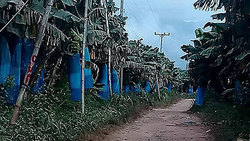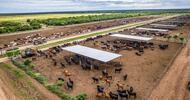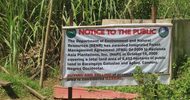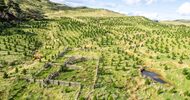
A Vietnamese-owned banana farm is shown in southern Laos's Savannakhet province in an undated photo. RFA/VD
Lao Banana Workers Sickened by Chemicals Used on Farms
Lao workers at Chinese-operated banana plantations are falling ill in large numbers from exposure to chemicals used on the farms, with many suffering from respiratory or liver problems, sources in the Southeast Asian nation say.
Lao government orders began closing down the environmentally destructive farms in the country’s northern provinces in January 2017, with the ban shuttering the commercial operations when their contracts expire and forbidding new contracts from being signed.
In the Maung Sing district of northern Laos's Luang Namtha province, meanwhile, at least 20 banana workers, many already having left their work on the farms, come each month to the local hospital for treatment, a hospital official told RFA’s Lao Service.
“The chemicals affected their health after they had worked for even six months or one to two years in the fields,” RFA’s source said, speaking on condition of anonymity. “Now they have liver problems, and are chronically tired and fatigued when they come to us, sometimes with related diseases.”
Pregnant women working in the fields are especially at risk from chemical exposure, the hospital official said, adding that many go into labor prematurely, sometimes giving birth to deformed children.
One woman, a resident of Maung Sing, fell ill two years ago after working for a year at a Chinese banana farm in northern Laos’s Phongsaly province, a village health worker told RFA, also on condition he not be named.
Though the company released the woman from employment when it was clear that she was sick, “they have said they are not responsible for her illness, and she is only receiving basic health care from her district,” the source said, adding that the woman is still gravely ill and not expected to survive.
In a 2016 report, the most recent available, by Laos’s Ministry of Agriculture and Forestry, six Lao farm workers died of pesticide or herbicide inhalation during the period 2012 to 2015, with three deaths reported in Champassak province in the south, and two in Xieng Khouang province and one in Bokeo province in the north.
Safety assurances doubted
Meanwhile, four or five banana workers at a Chinese plantation in Muang Nan district in northern Laos’s Luang Prabang province were left covered in rashes after falling ill in December and are being treated in a local hospital, a district health official told RFA, speaking on condition of anonymity.
As many as a hundred others in the district may also be ill but are not seeking treatment, she said.
Bananas are now farmed in six northern provinces of Laos, in four provinces in the central part of the country, and is four provinces in the south, with other farms growing sugarcane, melon, cabbage, lettuce, and other crops.
All use polluting chemicals, sources say.
And while banana farming is slowly being phased out in the country’s north, Lao authorities granted a large concession in May to a Vietnamese company growing bananas in southern Laos’s Savannakhet province for export to Europe and Russia.
Government assurances of protection from chemical pollution at plantations in the south are widely doubted, sources say.
Illnesses and deaths have long been reported among Lao workers exposed to chemicals on foreign-owned farms, with many suffering open sores, headaches, and dizzy spells, sources told RFA in earlier reports.
Chemical run-off from farms has also polluted many of the country’s water sources, killing fish and other animals and leaving water from local rivers and streams unfit to drink, sources say.
Reported by RFA’s Lao Service. Translated by Sidney Khotpanya. Written in English by Richard Finney.












